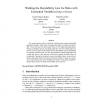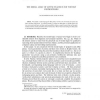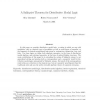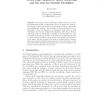797 search results - page 13 / 160 » Logics with an existential modality |
89
Voted
KR
2010
Springer
15 years 5 months ago
2010
Springer
We consider positive rules in which the conclusion may contain existentially quantified variables, which makes reasoning tasks (such as Deduction) undecidable. These rules have t...
91
Voted
JSYML
2008
15 years 22 days ago
2008
We consider a modal language for affine planes, with two sorts of formulas (for points and lines) and three modal boxes. To evaluate formulas, we regard an affine plane as a Kripke...
106
Voted
AISC
1998
Springer
15 years 5 months ago
1998
Springer
While propositional modal logic is a standard tool, first-order modal logic is not. Indeed, it is not generally understood that conventional first-order syntax is insufficiently ex...
103
Voted
APAL
2005
15 years 20 days ago
2005
In this paper we consider distributive modal logic, a setting in which we may add modalities, such as classical types of modalities as well as weak forms of negation, to the fragm...
87
Voted
DLOG
2007
15 years 3 months ago
2007
We present a query answering technique based on notions and results from modal Correspondence Theory. It allows us to answer a wide family of conjunctive queries by polynomial redu...




